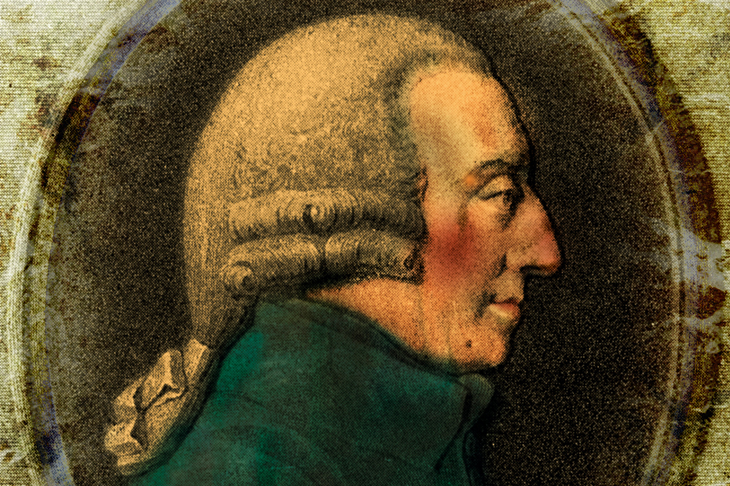Jesse Norman is one of only three or four genuine intellectuals on the Tory benches in the House of Commons. It must vex him, as it does most of us with A-levels, to witness the distressingly ignorant, chaotic and unprincipled way in which the government, run by the party of which he is a member, conducts its business and that of the country. Those who control the destinies of that government would do well to read his book on Adam Smith, and indeed Adam Smith himself. Smith’s Theory of Moral Sentiments — which Norman correctly esteems as a fine work of philosophy with a great bearing on how we should run a civilised society — would, like its successor The Wealth of Nations, give our rulers much to think about in respect of how they discharge their duties and what proper governance really means: if they had the wit, and lacked the venality, to act on it.
Norman, whose own hinterland in political philosophy is, as he shows here and in his previous life of Edmund Burke, deep and considerable, seeks to rehabilitate Smith, who (though he does not explicitly say so) has clearly been tarnished by some sort of association with Margaret Thatcher and libertarian think-tanks. This is an unnecessarily squeamish approach. At the core of the book, between a brisk but thorough biographical essay and a somewhat less brisk (and indeed at times ponderous) assessment of Smith’s thought and its relevance to today, Norman sets out five myths about the Sage of Kirkcaldy and effectively demolishes some of them.
He disputes that there is an ‘Adam Smith problem’, something invented, almost inevitably, by the Germans, that consists of a Smith motivated by altruism (as in The Theory) and a Smith who elevates selfishness and greed (The Wealth). Norman says the two works fit together, and he is right: one is the necessary prelude to the other, not least because it sets out the ground rules of the sort of society in which Smith’s economic inquiries take place.
This leads on to the second myth, that ‘Adam Smith was an advocate of self-interest’. As Norman points out, asserting the legitimacy of commerce and capital accumulation hardly makes Smith evil. Such contentions support his idea of personal liberty; they emphasise the break with the ancient system of feudalism, which kept everyone in his or her place. Smith vigorously defends the importance of commerce to the public good. Norman highlights the difference between self-interest and self-love; Smith was a sufficiently enlightened moralist to understand, too, that one could pursue self-interest in a fashion that did not disoblige others, who were pursuing their self-interest too. The expansion of commerce enriched those who took part in it and, in the end, favoured the consumer — provided monopolies, which Smith also hated, were avoided.
Norman emphasises that Smith never used the term capitalism, as if it is somehow a term of abuse. In fact, the OED attributes to Thackeray the first use of the term in English, in 1854, almost 80 years after Smith published his work: but it is hard to imagine he would have found the term distasteful, not least because, as an expert rhetorician himself, he would have valued it for the economy with which it expresses the concept it describes.
Norman says the third myth is that Smith was ‘pro-rich’. Again, so what if he was? But of course, The Wealth is more subtle than that. Scotland and England were both expanding commercially in the 18th century — Norman reminds us that Smith spent many years in England, first at Oxford and then later in London as a not-much-loved acquaintance of Dr Johnson — but those who were becoming rich were mostly doing so by hard work, ingenuity and risk-taking, which Smith most certainly favoured. Smith sees a level playing field in which anyone with those attributes can flourish; and who, when flourishing, will open up economic opportunities further down for those who lack their courage, their brains or their buccaneering spirit. Norman does not say so in these terms — and he should have done — but there is a distinction between favouring the rich and favouring the creation of circumstances in which as many as possible have the chance to become rich, or at least to become richer than they were before.
The fourth myth is that ‘Adam Smith was anti-government’. Since we are touching on the author’s day job it is not surprising that he makes a robust defence of the Sage’s attitude towards government, listing various state interventions of which he approved. But would Smith really have endorsed the enormous state we have today, the greedy way in which it soaks up huge tax revenues and spends them so unwisely, and its insatiable appetite to intervene and distort the economy? As Norman writes in the book’s biographical section, Smith was the sworn enemy of the mercantilism that saw 18th-century Britain exploit the American colonies, taking raw materials cheaply from them, making finished products out of them and sending them back at a whacking profit. Governments created and perpetuated the system by which this could happen. Smith’s legitimately outraged reaction suggests how he would feel if he saw some of the horrors carried out by Norman’s party today in the name of governance. As he correctly said, markets were, in Smith’s view, conducted best in an atmosphere of trust and confidence, not refereed by a drunken, hectoring lout such as Jean-Claude Juncker.
The fifth myth, which Norman correctly dismisses, is that Smith ‘was first and foremost an economist’. The Theory proves that: as does Smith’s extensive knowledge of rhetoric and the classical arts. He was a polymath, as well as being what the 21st century would call a behavioural scientist; but, understanding human nature as well as he did, he saw just how much of human behaviour was affected by the pursuit of money.
Norman says Smith did not predict the Industrial Revolution, which was cranking up as, after a lifetime of hypochondria, he was in fact dying (he expired in 1790). Well, for a start The Wealth does not pretend to be a work of astrology or prediction; but Smith, surely, knew what was coming more than most. It was not merely the activities of merchants that were expanding: so were the activities of producers, as he noted in his famous observations about the division of labour. He had a keen interest in mechanics and wished he had studied the subject. He might not have written about technological progress in The Wealth but he could see it around him, and he effectively set the ground rules for how the capitalist society that would arrive with a vengeance within 20 or 30 years of his death should conduct itself — and how and why it would be motivated.
While perhaps some of Norman’s analysis of Smith’s thought is open to debate, that section of book is well-argued and clearly presented. The final section is more problematic, as Norman tries, in passages of often great density, to relate Smith’s thought to the problems of today. As the author admits, he is thinking of Smith in the shadow of the 2008 crash. By that stage we had a financial system that existed not principally for the funding of commerce, but to act as a casino for those fortunate enough to play in it with other people’s money. We are yet to work out a reform of capitalism in a sufficiently unsuffocating way that prevents such abuses from happening. Were some of the architects of the 2008 debacle still sewing mailbags as guests of Her Majesty one might feel more confident: Smith, one suspects, would have favoured regulation based on ‘trust and confidence’, with the law crashing down on those who broke such trust. His later years in Edinburgh were spent in charge of stopping the smuggling operation in that city, so he knew about those who broke the rules and undermined what we now call capitalism.
Although the last section is at times self-indulgent and opaque, Norman has made an impressive attempt to justify the ways of Smith to men (and, as he outlines in a strange passage in that last section, to women too). I wondered whether a joke was intended — I certainly laughed — when he disclosed that Royal Bank of Scotland invented the overdraft.
This book is well-written, well-argued and intensely thought-provoking, and it will rightly raise Smith’s posthumous reputation. I hope some of the author’s parliamentary colleagues summon up the moral and intellectual strength to read it.

























